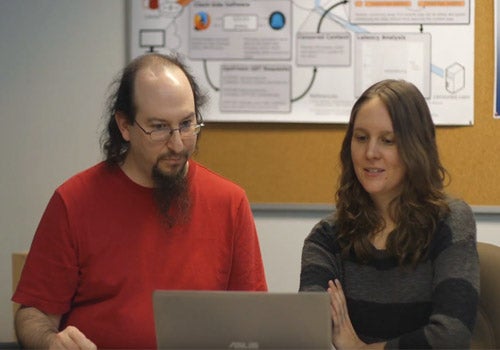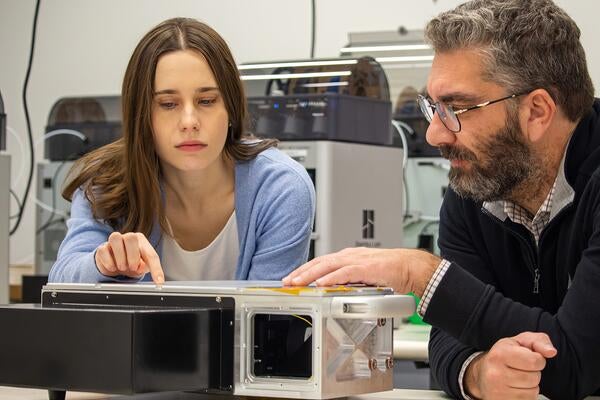
Tool will give people access to government-censored websites
Waterloo researchers are developing a censorship-resistance system called Slitheen to fool government censors

Waterloo researchers are developing a censorship-resistance system called Slitheen to fool government censors
By Joe Petrik David R. Cheriton School of Computer Science
Ian Goldberg, a professor in Waterloo's David R. Cheriton School of Computer Science and Cecylia Bocovich, a PhD student.
People living in countries where the Internet is censored will be able to use a new tool called Slitheen to access websites restricted by their governments. The technology is named after a family of aliens on Doctor Who that disguise themselves as humans to evade detection.
“Some countries block certain websites based on their web address or their content,” says Ian Goldberg, a professor in Waterloo’s David R. Cheriton School of Computer Science. “Similar to the Doctor Who aliens, our Slitheen censorship-resistance system works by disguising your connection to a restricted website — for example, a connection to Wikipedia or the New York Times — as that of an allowed website, maybe a site about cute cats.
“Slitheen lets you access the New York Times website by reshaping your traffic to make it look to the censor as though you are visiting the cats website,” says Goldberg. Cecylia Bocovich, a PhD student in Goldberg’s lab, and leader of the research project, adds, “Slitheen not only provides users with content blocked in their region, but it also protects them by hiding the fact that they are evading their country’s censorship policies.”
While open communication through the Internet has advanced the free exchange of information globally, Goldberg points out that a number of national governments restrict the ability of their citizens to communicate and access information freely online.People often think of privacy as the ability to protect their personal information, but keeping secrets is merely confidentiality — a small part of privacy, explains Goldberg, a founding member of Waterloo’s Cryptography, Security, and Privacy (CrySP) research group. “There’s a lot more to it: privacy is about autonomy, freedom and self-determination. For example, if you live in a country where the Internet is censored, then being able to freely download the content you desire is an example of privacy.”
Goldberg acknowledges that no matter how sophisticated a censorship-resistance system is, the work is never complete: “Unlike other fields of computer science, we have active adversaries. People see our research and how to protect a system and they use that to try to defeat it. We have to play both sides of the game — thinking like an attacker to try to defeat our own systems, in order to build better defences. There’s always an arms race where the defender makes a better system, then the attacker makes a better system. This is what makes the research fun and interesting but also very challenging.”

A car’s exhaust pipe emits black carbon. This sooty form of pollution alters the “light environment” beneath the snow, affecting plant growth. (Kmatija/Getty Images)
Read more
Research into light and snow interactions provides new insights into how pollution can affect vegetation growth and impact ecosystems

Read more
Researchers developed a process to reduce the amount of energy needed to run data centres

Read more
Phantom Photonics’ quantum remote sensing technology offers precision for industries operating in extreme environments
The University of Waterloo acknowledges that much of our work takes place on the traditional territory of the Neutral, Anishinaabeg, and Haudenosaunee peoples. Our main campus is situated on the Haldimand Tract, the land granted to the Six Nations that includes six miles on each side of the Grand River. Our active work toward reconciliation takes place across our campuses through research, learning, teaching, and community building, and is co-ordinated within the Office of Indigenous Relations.